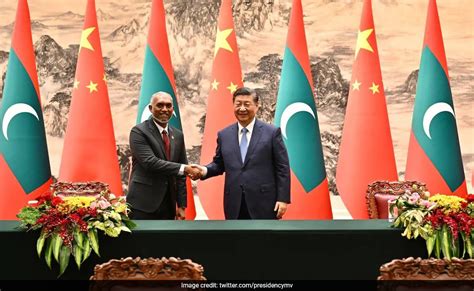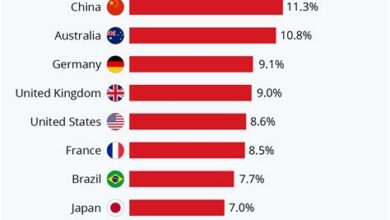Maldives and China Sign New Trade Agreement

Explore the background, negotiations, and impact of the new trade agreement between Maldives and China. See reactions from Chinese government and businesses.The Maldives and China recently made headlines with the signing of a new trade agreement, marking a significant milestone in their longstanding trade relations. This blog post will delve into the background of their trade relations, the negotiations that led to the new agreement, its key terms, and the expected impact on the Maldives’ economy. Additionally, we’ll explore the reaction from the Chinese government and businesses, shedding light on what this agreement means for both parties involved. As the Maldives continues to strengthen its ties with China, this new trade agreement is poised to have far-reaching effects on the country’s economy and its global trade partnerships. Join us as we break down the details of this pivotal development and consider the implications it holds for both nations.
Background of Maldives-China trade relations
The Maldives and China have a long history of trade relations dating back to several centuries. The Maldives, with its strategic location in the Indian Ocean, has been a key trading partner for China for centuries. The Maldives has always been an important link in China’s maritime Silk Road and has historically been a hub for trade between China and other countries in the region.
Over the years, the trade relations between the two countries have evolved significantly. In the past, the trade between Maldives and China was primarily focused on traditional goods such as fish, coconuts, and other marine products. However, with the advent of modern technology and globalization, the trade relations have expanded to include a wide range of products and services, including infrastructure development, tourism, and telecommunications.
In recent years, there has been a significant increase in the volume of trade between the Maldives and China. This has been largely driven by China’s growing interest in the Indian Ocean region and its increasing investment in the Maldives. The two countries have also been working together to explore new opportunities for trade and investment, and to strengthen their economic ties.
Negotiations for new trade agreement
As the Maldives and China were looking to further strengthen their trade relations, negotiations for a new trade agreement were underway. Both countries aimed to enhance their economic cooperation and create a more favorable environment for trade and investment. The negotiations involved discussions on various aspects of the trade agreement, including tariffs, market access, and intellectual property rights.
The negotiations for the new trade agreement between Maldives and China were complex and thorough, as both parties sought to address the interests and concerns of their respective industries and businesses. The discussions also focused on promoting fair competition and ensuring that the trade agreement would bring mutual benefits to both countries.
After several rounds of negotiations, the two countries finally reached an agreement that included key terms such as tariff reductions, improved market access, and protection of intellectual property rights. The successful negotiations were hailed as a significant milestone in the bilateral trade relations between Maldives and China, paving the way for a more robust and mutually beneficial trade partnership.
Key terms of the new trade agreement
In the newly signed trade agreement between Maldives and China, several important key terms have been established to govern the trade relationship between the two countries. These key terms cover a wide range of aspects including trade tariffs, investment regulations, and cooperation in various economic sectors.
One of the key terms of the new trade agreement is the reduction of tariffs on certain goods imported from China to Maldives. This reduction in tariffs aims to promote trade between the two countries and to increase the flow of Chinese goods into the Maldivian market. Additionally, the trade agreement includes provisions for investment regulations which aim to provide a clear framework for Chinese investments in Maldives, including guidelines for ownership and operation of businesses in the country.
Furthermore, the trade agreement outlines cooperation in various economic sectors including tourism, infrastructure development, and technology transfer. These provisions aim to facilitate collaboration and exchange of expertise between Maldives and China, which will contribute to the growth and development of both countries’ economies.
Expected impact on Maldives’ economy
Maldives’ recent trade agreement with China is expected to have a significant impact on the country’s economy. With the new trade agreement in place, Maldives is likely to see an increase in trade and investment from China, which could lead to economic growth and development. The agreement is also expected to open up new opportunities for Maldivian businesses to export their goods and services to the Chinese market, potentially boosting the country’s export revenue.
Furthermore, the new trade agreement could lead to the development of infrastructure and other key sectors in Maldives, as Chinese investment is expected to flow into the country. This could create new jobs and stimulate economic activity, ultimately contributing to the overall growth of the Maldivian economy. Additionally, the agreement may also result in the transfer of new technologies and knowledge from China to Maldives, which could further enhance the country’s economic development and capacity.
However, there are also potential risks and challenges associated with the new trade agreement. Increased dependence on China for trade and investment could make Maldives vulnerable to economic fluctuations and geopolitical tensions. Additionally, there may be concerns about the impact of Chinese investment on local industries and the environment. It will be important for the Maldivian government to carefully manage these risks and ensure that the benefits of the new trade agreement are maximized while mitigating potential negative consequences.
Reaction from Chinese government and businesses
After the signing of the new trade agreement between Maldives and China, the Chinese government and businesses have shown a positive reaction. The government officials have expressed their satisfaction with the terms of the agreement, citing the potential for increased trade and investment opportunities. They have emphasized the significance of the agreement in further strengthening the bilateral relationship between the two countries, and have pledged their support in promoting economic cooperation.
On the other hand, Chinese businesses have also welcomed the new trade agreement, highlighting the benefits it will bring to their commercial activities in the Maldives. They have lauded the favorable terms of the agreement, such as reduced tariffs and streamlined trade procedures, which are expected to facilitate smoother trade operations. Many Chinese companies have already indicated their interest in expanding their presence in the Maldives, and are optimistic about the potential for enhanced business prospects in the country.
Overall, the reaction from the Chinese government and businesses to the new trade agreement with Maldives has been overwhelmingly positive, reflecting a strong commitment to fostering closer economic ties and mutually beneficial cooperation. This bodes well for the future of trade relations between the two nations, and sets the stage for increased economic collaboration in the years to come.





